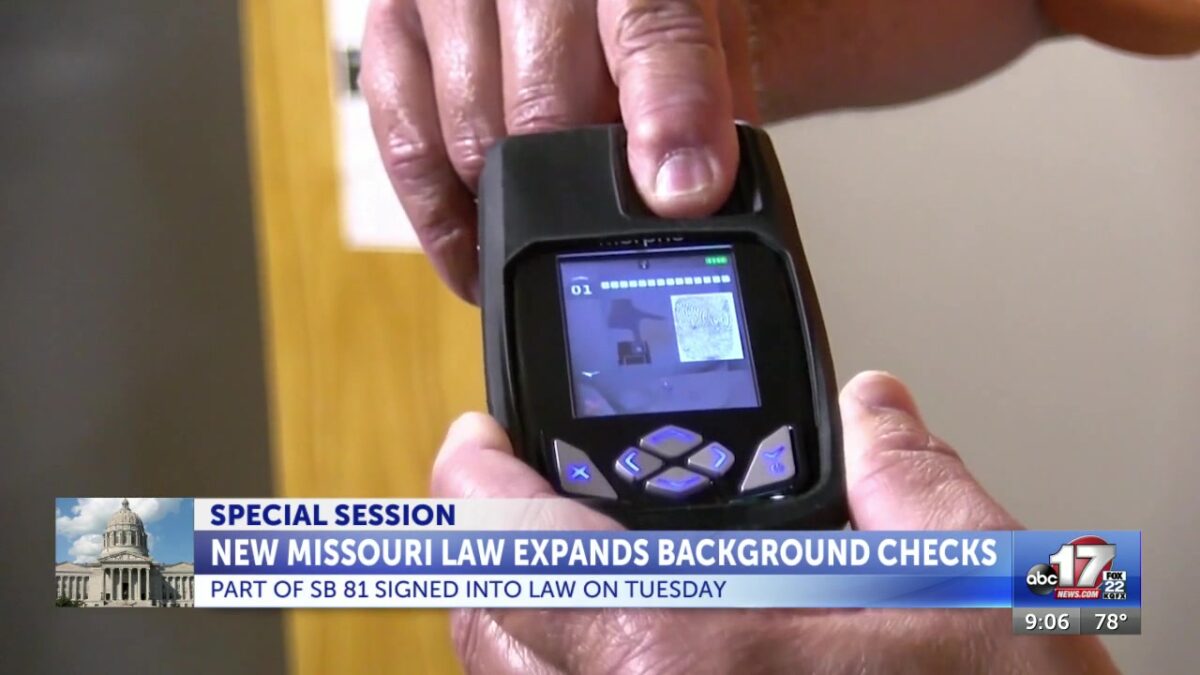New Missouri law expands background checks, first responder benefits

Mitchell Kaminski
COLUMBIA, Mo. (KMIZ)
Missouri Gov. Mike Kehoe on Tuesday signed a wide-ranging public safety bill that expands fingerprint-based background checks for professional licensing, updates fireworks regulations and extends several key state programs.
The legislation, known as Senate Bill 81, was sponsored by Sen. Kurtis Gregory (R-Cooper County) and Rep. Tim Taylor (R-Howard County) and aims to modernize Missouri’s approach to public safety oversight.
While the bill’s foundation lies in updating the state’s fireworks standards, it also includes substantial policy shifts — particularly in criminal background screening and licensure protocols.
“The governor has been consistent with his advocation for public safety and so this bill fits right in,” Taylor said. “Once I got a hold of it, we were able to change the title a little bit because there were a couple of very important public safety things that I wanted to see get passed this year. And it was a perfect, perfect carrier for that stuff.”
Reinforcing background check procedures
One of the more-notable provisions grants statutory authority to dozens of state agencies and licensing boards to conduct fingerprint-based criminal background checks, aligning Missouri with updated FBI policy.
“Missouri is actually the last state in the country to adapt the way this background check program works,” Gregory said. “This will allow us to continue to have access to a federal database in regards to people trying to seek these professional licenses.”
Under the new law, applicants for professional license s— including health care workers, realtors, educators and financial service providers — can be required to submit fingerprints to the Missouri State Highway Patrol, which will forward them to the FBI. Any findings will then be shared with the licensing body.
“Let’s say someone moves from New York to the state of Missouri and is trying to obtain the realtor’s license. If we would not have passed this, Missouri would have not had access to the background check systems in all the other states. And so we might have given a license to a realtor that has a rape charge or something in one of these other states,” Gregory said. “I don’t know about you, but I do not want my wife or my daughter or my mother being escorted around a home with no one else around by someone that had a crime like that in their history.”
Taylor echoed the importance of strengthening the state’s database access.
“The MULE system that we use here in Missouri for doing background checks, we have that within the state. The NCIC and the NIX from the national level, we needed to update our stuff so that we could reach into that database; so that when people were coming into the state and they required background checks and fingerprint checks, we were able to get that information,” Taylor said. “This allows us to look into that national database to be able to see what their background is, to be sure that someone who’s nefarious doesn’t get in the wrong spot here.”
Line of Duty Compensation Act extension
SB81 also extends the Line of Duty Compensation Act — which provides financial support for the families of fallen first responders — through Dec. 31, 2031, avoiding a looming expiration date on June 19.
“The other thing that was to the heart of what I am passionate about was the line of duty death benefit for first responders that was set to expire this June or this month, actually,” Taylor said. “So we were able to reinstate that date and extend it out so that now it goes quite a few more years.”
The line-of-duty benefits expand to all personnel in the public safety realm, such as ambulance drivers, volunteer firefighters, police officers, and are set at $25,000.
“What’s most important about that, one thinks that $25,000, isn’t that great? What that does, though, is we are the first line to start the ball rolling for those individuals to get the federal level reimbursement, which is quite a bit more.”
Taylor also emphasized the urgency of renewing the law.
“There was going to be that two-month window where there was going to be no coverage for that line of duty death benefit,” Taylor said. “And Murphy’s Law would tell you that something bad would happen to somebody in those two months. So it was really good.”
Other measures
Other provisions include:
Allowing spouses of Missouri law enforcement officers to receive expedited license waivers, similar to existing military spouse provisions.
Extending the Missouri Emergency Response Commission’s fee collection authority through 2031.
Expanding civil liability for childhood sexual abuse, including voiding nondisclosure agreements in such cases.
Taylor, who is in his fifth year with the Missouri House, said this year’s legislative session was much more productive than past years.
“This year was quite an anomaly as to the years that I’ve been here,” Taylor said. “The first four years have been hard to get anything done.”
The legislation takes effect Aug. 28.